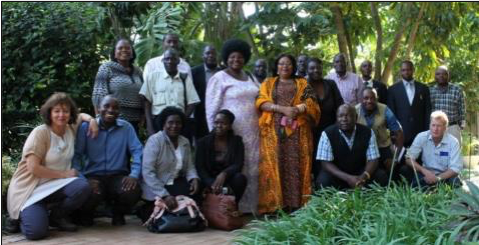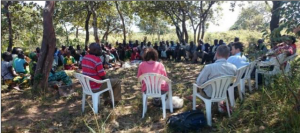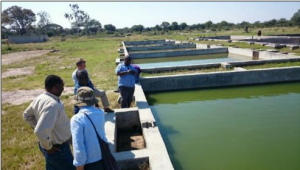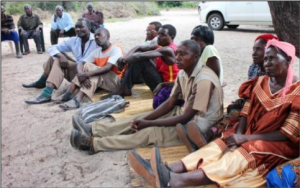First published on 08/29/2015, and last updated on 03/29/2018
By: Mordecai O. Ogada, ICCA Consortium Coordinator for Eastern Africa and Grazia Borrini-Feyerabend, ICCA Consortium Global Coordinator
A short field visit and a half day workshop on ICCAs for key national actors co-organised with UNDP GEF SGP Zambia provided the ICCA Consortium with an interesting picture of the Zambian context— a mix of challenges and opportunities at both institutional and community levels. While this article focuses on the field visit, the dedicated ICCA workshop in Lusaka provided an invaluable occasion to explore with key actors and advisors the potential and limitations of Zambian traditional knowledge and diverse customary institutions for “governance for the conservation of nature”. This was particularly important in view of ICCA GSI, as Zambia is one of the countries that will be fully involved and assisted by GSI. For instance, at this event, we held discussions with several local actors and learned that a national network on community conservation—although not very active– does exist and could be revamped to support ICCAs.
Zambia is a country endowed with abundant natural resources, including fisheries, wildlife, vast forests and mining ores, coupled with a relatively low human population (15 million people). It is also home to a number of feudal chiefdoms, where the chief traditionally holds full control over all the land and natural resources therein. Today, the power of chiefs has found ways to coexist with the power of the state and party politics. This unlikely equilibrium may be seen in a spectrum from “amazing capacity to coexist and combine tradition and modernity” to “doubling the top-down burden to communities and impeding their own capacities to self-govern their territories”. Like in most other African countries, a number of international and national NGOs also operate in Zambia, ostensibly to improve the capacity of communities to sustainably manage their natural resources.
In April 2015 we set out for a 3-day field visit, organised by the UNDP GEF SGP country coordinator, Ms. Gertrude Chiholyonga, to learn more about Zambian ICCAs and their potential for effective recognition and support. We visited a couple of sites that GEF SGP initiatives have been supporting, which were perceived as promising for ICCA learning and flourishing.
Our first field visit took place in Choma district, where we met a beekeeping self-help group engaged in diversifying its food production and sources of income to improve food security. Besides beekeeping, the options they explore include goat rearing, chicken farming and adding value to non-timber forest products. The major livelihood challenge facing this rural community (and many others in Zambia) is its over-reliance on maize for both food and sale in markets. Recent years have seen below-average rainfall and resultant failures of the maize crop. This, in turn, has forced some people into alternatives such as migration and charcoal burning to supplement their income. The community we visited suffered from that. They stressed that their environment was damaged by the indiscriminate cutting of trees by charcoal makers from within and outside their region, which they had no power to control. Both their chief and the local forestry officers were alleged to have issued permits for charcoal burners to participate in the destruction of the local environment. The low level of livestock keeping in the area was likely to induce a dependence on wild birds and mammals for protein supply in the local diet. There was, in fact, a noticeable scarcity of visible wild bird and mammal life in the forest.
GEF SGP initiatives have helped the NGO Alliance for Nutrition and Reconstruction to support the community we visited to add value to various forest products, for instance by drying wild mushrooms, vegetables and mangoes and commercialising them in urban areas. The aim was for the community to have reliable and sustainable livelihoods that do not entail destruction of the forest and the biodiversity therein.
As we talked with the community, we heard that they have a traditional shrine in the forest, and a good sense of the intrinsic multiple values of their territory for their identity and culture as well as livelihoods. They provided, in fact, an excellent example of a community where self-awareness and analysis and empowered decision making and action could indeed develop an ICCA relationship with their traditional territory and natural resources. This, however, is most unlikely to happen in the absence of determined support of their capacity to govern the land and autonomously and competently decide what is and is not allowed to happen there.
The next visit was in Kazungula district, which borders Namibia across the Zambezi River. This area includes two powerful feudal chiefdoms, Sekute and Inyambo, and is even richer than Choma in natural resources, including forests, fisheries and abundant wildlife, particularly elephants. Due to its significance as a wildlife habitat and migratory route, the area has drawn the involvement of the African Wildlife Foundation (AWF), an international NGO that has received support from GEF SGP for various projects to enable communities to conserve their natural resources and secure their livelihoods. One such project is the so-called “Sekute Community Conservation Area”— an area that communities have agreed not to occupy and cultivate and that they protect, including via community guards, as a wildlife corridor (well… no elephants there, but we did find elephants perilously crossing highways in areas close to wetlands). We also visited Lupani Community School, an impressive school building where children are offered environmental education, among other subjects, and Machenje Fishing Lodge, a multi-million tourism facility built for the community by an impressive array of donors and managed by a private investor who pays a lease fee. Other interventions include a large aquaculture project set up by AWF to provide income to fishing communities who agree to set up their aquaculture schemes and reduce their dependence on wild fisheries in the Zambezi. All these projects are being implemented within the framework of the chiefdoms and the regulations thereof.
In terms of developing the necessary conditions for ICCAs to emerge and flourish, we were concerned that the interventions do not appear to address some evident shortcomings in the interactions of these communities with their environment. For example, the aquaculture scheme is actively promoted by AWF on the basis of a model fish farm they initially set up. The scheme is based on fishermen groups—not overall communities—and effectively places those groups in debt for the necessary infrastructure, which is dependent on plastic and commercial inputs. While we are ready to believe that the model may be commercially viable (although the initial large investment for the district infrastructure producing fingerlings was donated), similar models have enslaved producers to their financial lenders in many countries. In addition, the fishermen groups are encouraged to release 10% of their fingerlings into the Zambezi to promote the restocking of wild fisheries (a requirement to obtain the support of GEF SGP, as small grants must relate to “conservation aims”). This, however, is to be done in the absence of initiatives that address the root cause of the problem of such wild fisheries, i.e., the lack of meaningful and well-enforced rules about who is allowed to fish in the Zambezi and with what specific equipment. We insisted on the subject and finally learned that the communities had developed their own rules for the stretches of the Zambezi in which they traditionally fish. But we also heard that– once again– a combination of higher powers involving the chief and government officials prevented them from enforcing such rules. We also saw with our own eyes the monofilament nets used to fish in the river (a well-known killer of fisheries throughout the world) that ICCA-aware communities spontaneously ban from their territories.
Conversations with community members revealed a close cultural connection between the people and their natural environment and widespread awareness of the intrinsic value of natural resources for their lives. We believe that this is what ICCA GSI could build upon and make flourish. We also believe that supporting NGOs – and in particular those of great calibre and national standing – should add the necessary political advocacy to make sure that communities are allowed to govern and manage their land, water and natural resources according to what they know and/or learn to be sustainable. This is what the Consortium aims to cultivate in the countries where it will support ICCA GSI initiatives, including in Zambia, whose beautiful people, landscapes and wildlife impressed us greatly during the visit and gave us good hope for the future.
- Meeting with Chiyavula community group. Choma © M. Ogada
- AWF supported aquaculture project at Mwandi © M. Ogada
- Meeting with fishermen involved in aquaculture. © Gbf



